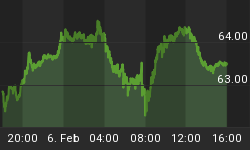Below is an extract from a commentary originally posted at www.speculative-investor.com on 5th November 2006.
We often read about the inflation threat posed by stronger economic growth, with the word inflation here referring to a rise in the general price level. Inflation is, of course, a rise in the total supply of money, but for the purposes of this discussion there's no need to dwell on the importance of getting this particular definition right. What we'll dwell on today is the absurdity of the notion that growth causes prices to rise.
Central bankers will regularly refer to something called "the rate of economic growth consistent with low inflation" as if a higher rate of real economic growth would be expected to lead to troublesome increases in the general price level. The implication is that inflation occurs because the economy, for some unspecified reason, begins to charge ahead at an excessive speed, and that when this happens it falls upon the central bank to do something to solve the problem.
Central bankers, however, have an excuse for spreading misinformation because one of their primary job requirements is to deceive. In order to maintain confidence in the monetary system the central bank must be vigilant in its efforts to direct attention away from the true source of the inflation (the central bank itself) and towards things that don't cast aspersions on the nature of today's national currencies. In this respect, 'too strong' economic growth is just a convenient excuse for a general rise in the price level, as are, from time to time, things such as oil supply shocks, the weather, increased Chinese consumption of commodities and the wage-hike demands of labour unions.
But what excuse do independent analysts/economists (those whose work is not funded by the government) have for spreading the lie that growth is somehow responsible for economy-wide increases in prices? That it is a lie will be immediately apparent to anyone who asks themselves the simple question: "How could the production of MORE goods and services possibly do anything other than put DOWNWARD pressure on the general price level?"
If something doesn't cause the money used within the economy to become worth less then the production of more 'stuff' will result in LOWER prices for the 'stuff'. Therefore, when more stuff is produced and prices still rise we know, for certain, that something MUST be causing money to lose its purchasing power at a fast enough rate to more than offset the positive effects, on the money's purchasing power, of the real growth. What is happening, in this case, is that the supply of money is increasing relative to the demand for money.
But couldn't an increase in the "velocity of money" (the rate at which the same money gets passed from person to person within an economy) cause the general price level to rise even if the supply of money remained constant?
The answer is no. Even if "velocity" were a useful monetary concept (it isn't) an increase in the velocity of money would have to be caused by something; the velocity of money couldn't just increase for no reason. So, someone who argued that an increase in the velocity of money was causing an increase in the general price level would then have to explain what was causing the increase in velocity in the first place.
"Money velocity" is a concept that is meaningless at best and dangerous at worst. It is potentially dangerous because, like the whole "growth causes inflation" argument, it helps to conceal the truth about what causes money to lose purchasing power. If, for example, the economy-wide demand for money begins to fall then people will be quicker to exchange their money for the things that money can buy and economists will observe an increase in the velocity of money. However, the crux of the matter is the reason WHY the demand for money is falling. The economy-wide demand for money doesn't fall in response to people becoming more productive; it falls because people expect the money to be worth less in the future than it is today.
In a growing economy, the ONLY way the general price level can rise over a long period of time is via an increase in the supply of money. Furthermore, under the current monetary system it is the central bank that ultimately controls how much new money is created. That is, the central bank causes inflation.















